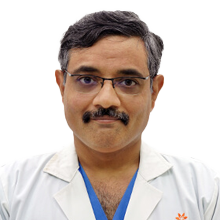Best Hernia Surgery Doctors in Hyderabad
Sr. Consultant Gastrointestinal, Laparoscopic & Robotic Surgeon
English, Hindi, Telugu, Malayalam
Day time OPD:
MON - SAT : 09:00 AM - 4:00 PM
Select preferred date and time to continue to book an appointment....
Dr Lalith Kumar Reddy Kanthala
MBBS(GGH, Guntur), DNB General surgery (Aster MIMS, Calicut), DrNB Surgical gastroenterology( Sir Gangaram Hospital, Delhi), Fellowship in HPB surgery & Liver Transplantation (Rela Institute, Chennai), Fellowship in advanced Laproscopic & Robotic Surgery (CSMU, Taiwan)Senior Consultant Gastro, HPB Oncosurgery & Liver Transplantation. Advanced Laproscopic, Robotic & Bariatric Surgery
Telugu, English, Hindi, Malayalam, Tamil
Day time OPD:
MON - SAT : 09:00 AM - 4:00 PM
Select preferred date and time to continue to book an appointment....
Sr. Consultant Surgical Gastroenterology, Laparoscopic, HPB & Robotic Surgeon
Telugu, English, Hindi
Day time OPD:
MON - SAT : 09:00 AM - 4:00 PM
Select preferred date and time to continue to book an appointment....
Senior Consultant Surgical Gastroenterologist & Robotic Surgeon, Advanced Laparoscopic & Metabolic Surgeon, HPB & Colorectal Surgeon
English, Telugu, Hindi
Day time OPD:
MON - SAT : 9:00 AM - 4:00 PM
Select preferred date and time to continue to book an appointment....
Senior Consultant Surgical Gastroenterologist, Hepato-Pancreatico-Biliary Surgeon, Laparoscopic, Bariatric & Metabolic Surgeon
English, Hindi, Telugu
Day time OPD:
MON - SAT : 10:00 AM - 05:00 PM
Select preferred date and time to continue to book an appointment....
Senior Consultant Surgical Gastroenterologist & Robotic Surgeon, Advanced Laparoscopic & Metabolic Surgeon, HPB & Colorectal Surgeon
English, Hindi, Tamil, Telugu
Day time OPD:
MON - SAT : 9:00 AM - 4:00 PM
Select preferred date and time to continue to book an appointment....
Minimal Access & Robotic GI Surgeon, Metabolic and Bariatric Surgeon
English, Hindi, Telugu, Odia
Day time OPD:
MON - SAT : 10:00 AM - 05:00 PM
Evening OPD:
MON - SAT : 05:00 PM - 07:00 PM
Select preferred date and time to continue to book an appointment....
Consultant Surgical Gastroenterologist & Robotic Surgeon
English, Hindi, Telugu
Day time OPD:
MON - SAT : 10:00 AM - 4:00 PM
Select preferred date and time to continue to book an appointment....
Senior Consultant Surgical Gastroenterologist & Robotic Surgeon, Advanced Laparoscopic & Metabolic Surgeon, HPB & Colorectal Surgeon
English, Hindi, Telugu
Day time OPD:
MON - SAT : 9:00 AM - 4:00 PM
Select preferred date and time to continue to book an appointment....
Sr. Consultant Surgical Gastroenterologist Minimal Access and HPB Surgery & Robotic Surgeon
English, Hindi, Telugu
Day time OPD:
MON - SAT : 09:00 AM - 04:00 PM
Select preferred date and time to continue to book an appointment....
Senior Consultant Surgical Gastroenterologist, Hepato Pancreatic Biliary, Colorectal, Bariatric & Advanced Laparoscopic Surgeon, HOD-Department of Surgical Gastroenterology
English, Hindi, Telugu
Day time OPD:
MON - SAT : 09:00 AM - 4:00 PM
Evening OPD:
MON - SAT : 05:00 PM - 06:00 PM
Services info not available
Select preferred date and time to continue to book an appointment....
Consultant Surgical Gastroenterologist, Hepato Pancreato Biliary & Laparoscopic Surgeon
Telugu, Hindi, English & Tamil
Day time OPD:
MON - FRI : 09:00 AM - 05:00 PM
Select preferred date and time to continue to book an appointment....
Sr. Consultant Surgical Gastroenterology, HPB, Bariatric & Robotic Sciences. Clinical Director
English, Hindi, Telugu
Day time OPD:
MON - SAT : 09:00 AM - 05:00 PM
Select preferred date and time to continue to book an appointment....
Consultant Surgical Gastroenterologist, Laparoscopic and Robotic Surgeon
Telugu, English, Hindi
Day time OPD:
MON - SAT : 9:00 AM - 4:00 PM
Select preferred date and time to continue to book an appointment....
FAQ’s
Is hernia surgery a major surgery?
Depending upon the type, whether open or minimally invasive (laparoscopic), where open surgery involves large incisions & has a longer recovery period, it is a major surgery, while laparoscopic surgery involves smaller incisions & needs shorter hospital stays, is often classified as minor surgery.
What kind of doctor do you see for a hernia?
General surgeons and surgical gastroenterologists repair the hernia & are specialized in diagnosing and treating hernias with minimally invasive procedures to ensure high precision & minimal discomfort.
Can a gastroenterologist treat hernias?
While gastroenterologists can help in the diagnosis & symptom management of hiatal hernia, the surgical repair is performed by general surgeons & gastroenterology surgeons.
Why should you choose Yashoda Hospitals for Hernia Surgery?
Yashoda Hospitals ensures comprehensive care for individuals with hernias through expert general surgeons & GI surgeons who are specialized in advanced techniques, including laparoscopic & robotic procedures, ensuring personalized care through world-class facilities. We have a proven record of successful hernia repair surgeries, making us the leading hospital for hernia surgery.


















 Appointment
Appointment WhatsApp
WhatsApp Call
Call More
More